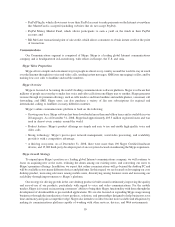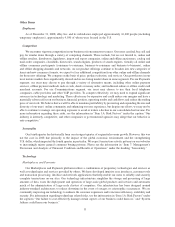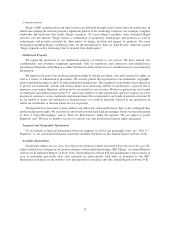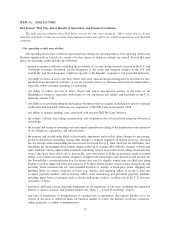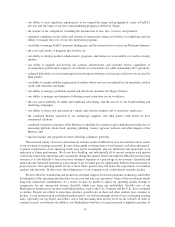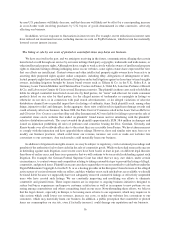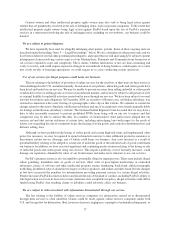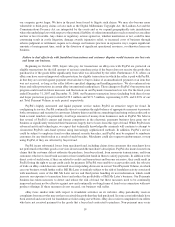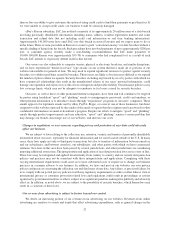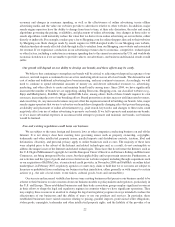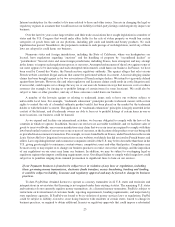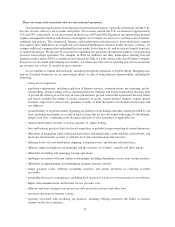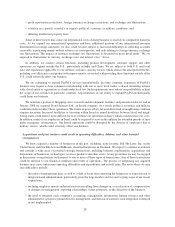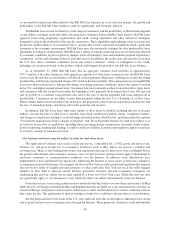eBay 2008 Annual Report Download - page 28
Download and view the complete annual report
Please find page 28 of the 2008 eBay annual report below. You can navigate through the pages in the report by either clicking on the pages listed below, or by using the keyword search tool below to find specific information within the annual report.because of miscommunication, because a buyer has changed his or her mind and decided not to honor the contract to
purchase the item, or because the buyer bid on the item maliciously in order to harm either the seller or eBay. In
some European and Asian jurisdictions, buyers may also have the right to withdraw from a sale made by a
professional seller within a specified time period. While sometimes eBay can suspend the accounts of users who fail
to fulfill their payment or delivery obligations to other users, eBay does not have the ability to require users to make
payment or deliver goods, or otherwise make users whole other than through our limited buyer protection programs.
Other than through these programs, eBay does not compensate users who believe they have been defrauded by other
users, although users who pay through PayPal may have reimbursement rights from their credit card company or
bank, which in turn will seek reimbursement from PayPal. eBay also periodically receives complaints from buyers
as to the quality of the goods purchased. We expect to continue to receive communications from users requesting
reimbursement or threatening or commencing legal action against us if no reimbursement is made. Our liability for
these sort of claims is only beginning to be clarified in some jurisdictions and may be higher in some
non-U.S. jurisdictions than it is in the U.S. Litigation involving liability for third-party actions could be costly
for us, divert management attention, result in increased costs of doing business, lead to adverse judgments, or
otherwise harm our business. In addition, affected users will likely complain to regulatory agencies that could take
action against us, including imposing fines or seeking injunctions.
Negative publicity and user sentiment generated as a result of fraudulent or deceptive conduct by users of our
Marketplaces and Payments services could damage our reputation, reduce our ability to attract new users or retain
our current users, diminish the value of our brand names. We believe that negative user experiences are one of the
primary reasons users stop using our services.
Any factors which reduce cross-border trade could harm our business.
Cross-border transactions using our websites generally provide higher revenues and gross margins than similar
transactions that take place within a single country due to higher transaction fees we earn for those transactions.
Cross-border trade has become an increasingly important source of both revenue and profits for us. To the extent
that any factors result in a net reduction in cross-border trade, including, among other factors, fluctuations in
exchange rates, the application of specific national or regional laws (e.g., selective distribution channel laws) to
users in other countries, or any other factors impose restrictions on, or increase the costs of, shipping goods across
national borders, our business would suffer. We believe that recent increases in the relative value of the U.S. dollar
versus other currencies have reduced cross-border trade between U.S. sellers and foreign buyers, without a
corresponding increase in cross-border traffic in the other direction, adversely affecting our business.
Our business is subject to online security risks, including security breaches and identity theft.
To succeed, online commerce and communications must provide a secure transmission of confidential
information over public networks. Our security measures may not detect or prevent security breaches that could
harm our business. Currently, a significant number of our users authorize us to bill their credit card accounts directly
for all transaction fees charged by us. PayPal’s users routinely provide credit card and other financial information.
We rely on encryption and authentication technology licensed from third parties to provide the security and
authentication to effectively secure transmission of confidential information, including customer credit card
numbers. Advances in computer capabilities, new discoveries in the field of cryptography or other developments
may result in a compromise or breach of the technology used by us to protect transaction data. In addition, any party
who is able to illicitly obtain a user’s password could access the user’s transaction data. An increasing number of
websites have reported breaches of their security. Any compromise of our security could harm our reputation and,
therefore, our business, and could result in a violation of applicable privacy and other laws. In addition, a party that
is able to circumvent our security measures could misappropriate proprietary information, cause interruption in our
operations, damage our computers or those of our users, or otherwise damage our reputation and business. Under
credit card rules and our contracts with our card processors, if there is a breach of credit card information that we
store, or that is stored by PayPal’s direct credit card processing customers, we could be liable to the credit card
issuing banks for their cost of issuing new cards and related expenses. In addition, if we fail to follow credit card
industry security standards, even if there is no compromise of customer information, we could incur significant
20


